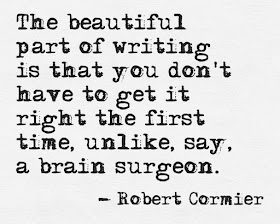"Once writing has become your major vice and greatest pleasure only death can stop it." —Ernest Hemingway
That's it. Sixteen. Each day. Just sixteen.
That's it. Sixteen. Each day. Just sixteen.
Why sixteen? That's the age in which we begin to emerge. Sure, for some it's earlier, others later, but if you had to pick an age when you first began to figure out who you might become, what was going to make your soul fly, heart flutter, world turn, sixteen would be the age to which many of us would point. Sixteen is the beginning of the journey.
So, as you emerge as a writer, sixteen minutes of work each day seems just right.
All of us can find sixteen minutes. Take public transportation? Sixteen. Waiting at the doctor's office? Sixteen. Hold off on the one binge episode of "Game of Thrones?" That's nearly four sixteen minute chunks. Think how much writing you can get done.
I've been asked many times over: How do you find the time to write? There is no trick. I simply find the time. It's a priority. It beats out several other things in my day. Cut out minutiae and you'll be amazed at the time you'll have. Think of writing as working out at the gym, having a meal, brushing your teeth. It's something you just do. You do not skip it. You do not dismiss it. You set aside a time—sixteen minutes—and you write. Do it early in the morning before the rush of work or late at night when the kids are in bed. Sixteen. That's all you need. And remember: discipline.
This doesn't mean you have to write every day. In fact, the mantra that has been spinning around writing communities and workshops for years might be bad advice. One still has to live a life to write about. So, write when it works for you but be sure to do one thing: make it a habit. Each morning. Every other day. Twice a week. Whatever it is that's good for you. Keep a log of your work. Ernest Hemingway used to keep a journal of the number of words he'd write at a sitting. It helped him focus on the goals. Also, do not wait for "inspiration." It will not come. Consider the craft and sit down and do the work. After you create your habits, stick with them as if you were reporting to the office. There is no such thing as "writer's block." Just write.
So what do you do with those sixteen minutes?
Write anything. Poems. A little story. A journal entry. Map out a bigger project and consider each step. If outlines and hard plans work for you, then do that. This doesn't work for me. I know what I want to write when I'm writing but I don't truly know what I'm trying to say until I write it. I'm more of a discoverer. If you need more concrete parameters then put them in place and start writing but write regularly and for at least sixteen minutes.
After you've found your stride, consider sharing your work. Sometimes this is hard for new writers. It can be daunting. Certainly writing can be therapeutic and personally helpful, and keeping it to yourself has worth, but sharing your stories is part of the work of a writer. Join a writing community. Share with friends. Post on Facebook. Ask for feedback, if you wish. Whatever works for you. Writing is introspective and sometimes lonely work but the glory is in the sharing. Also, do not judge your own work while your working. Leave judgment for another day. The words need to marinate. Hemingway was a big proponent of this practice. Write drunk, edit sober.
In February I begin my writing workshops at the Ernest Hemingway Birthplace Home in Oak Park, Illinois. I love meeting the writers who attend and especially look forward to hearing the stories they have to tell. Join us. Here's the link: Hemingway Workshops.




Nice post! This is a very nice blog that I will definitively come back to more times this year! And I hope that other readers will also experience how they feel after reading your article.
ReplyDeletebest game Tomb Runner Mommy Elsa Baby Caring play for free best gameBlocky Craft Police Squad